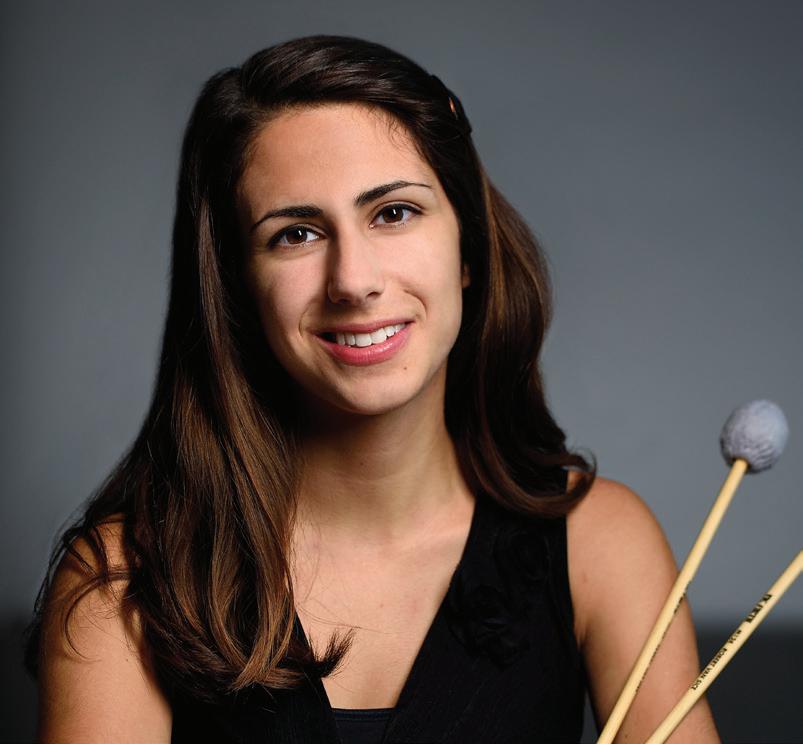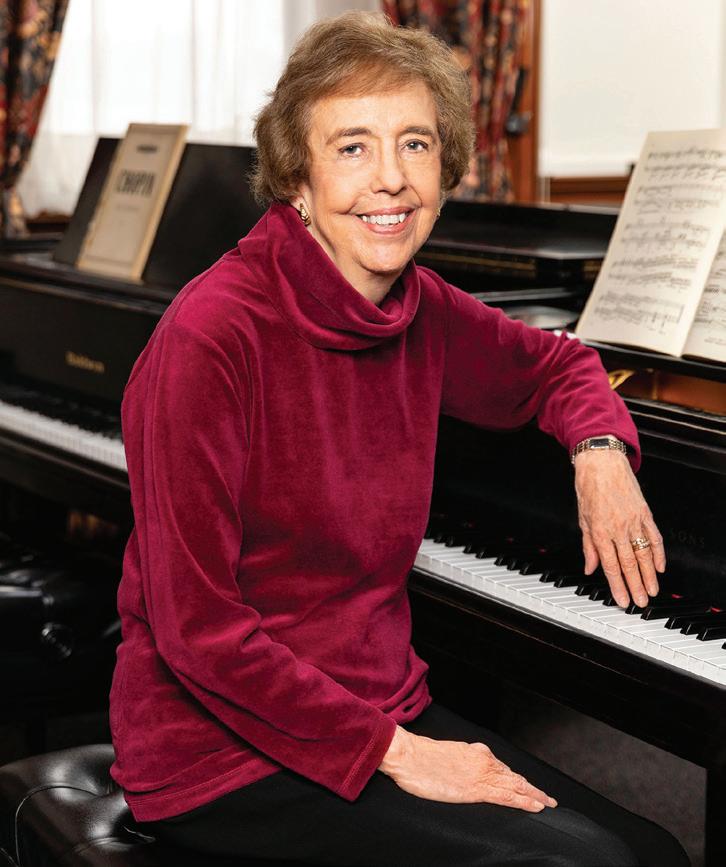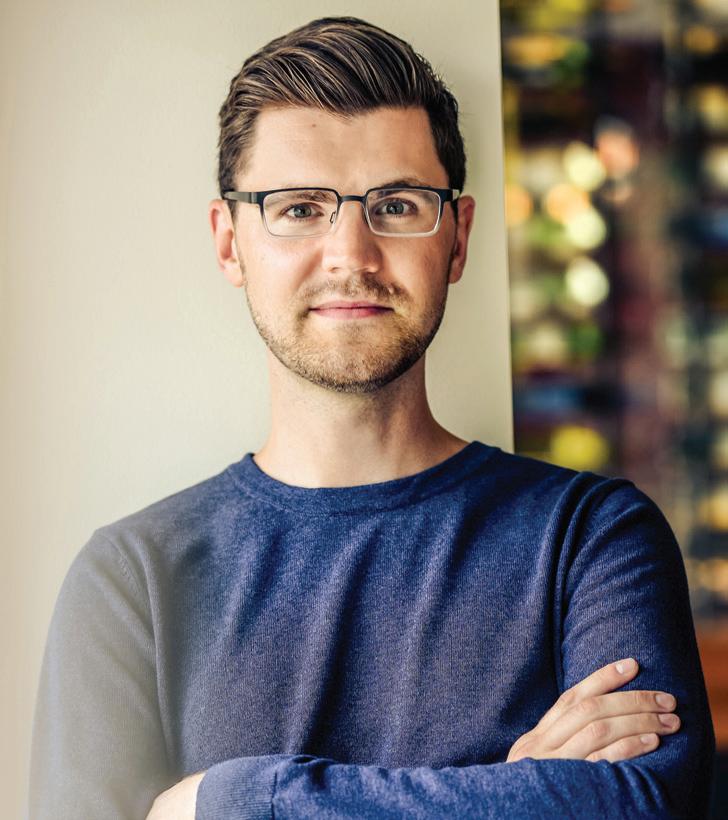
7 minute read
Alumni Profiles
Inspiring Community Connections
Last winter, Johns Hopkins University launched the powerful and much anticipated platform OneHop Mentoring to make it easy for students to connect with alumni as potential mentors. And Peabody is fully on board.
Advertisement
Peabody students are already participating in the universitywide flash mentoring program, in which they have immediate access to alumni who have created online profiles and are making themselves available for one-on-one conversations to answer specific career-related questions.
And Peabody’s LAUNCHPad career team is unveiling a more formal mentorship program through OneHop Mentoring this fall. The new program matches third-year undergraduate and first-year graduate students with recent alumni in a relationship designed to last at least as long as the academic year — and perhaps a lifetime.
“The idea is that recent alumni will really be able to identify with current students, having just gone through school and graduation themselves,” says LAUNCHPad Assistant Director Christina Manceor (MM ’17, Percussion). “And the alumni seem really excited about giving back to their fellow students and becoming part of a supportive community with the potential to benefit everyone involved.”
The LAUNCHPad staff expects to match as many as 170 mentor/ mentee pairs, a project that would have been overwhelming before OneHop Mentoring.
“OneHop Mentoring allows us to match students and mentors based on any number of factors, including their areas of study, personal interests and history, and even things like whether they speak a certain language fluently,” says Manceor. “We can use all of the factors students and alums include in their profiles to help connect students with mentors who might share and identify with their experiences in really special ways, something we did not have the ability to do before.”
There are also plans to try to integrate the mentorship program into the foundational courses LAUNCHPad coordinates as part of Peabody’s Breakthrough Curriculum to prepare music students for 21st-century careers. Students might interview or brainstorm project ideas with their mentors, for instance.
“The great thing about OneHop Mentoring is that it makes things so easy,” Manceor says.
Students and alumni simply visit the Peabody Mentoring Program page, read the instructions, and click on “Join Program” to get started. And students and alums can sign up for the flash mentoring program at onehop.jhu.edu/hub/mentoring.
“Students are often so caught up in all that they have to do, they don’t have time to think about where they are going,” Manceor says. “Ideally, these connections will inspire new ideas, career possibilities that hadn’t even occurred to them, and greater confidence, not least because when they graduate they will already have a professional network and won’t feel entirely on their own.” — Joan Katherine Cramer
Christina Manceor discusses her work at Peabody and LAUNCHPad: bit.ly/3mhBcDd

True to Her Craft Alumni Profile
Most legends have a great back story. Johns Hopkins Alumni Association Distinguished Alumna Award recipient Nelita True (DMA ’76, Piano), the world-renowned pianist and teacher and professor emerita of piano at the Eastman School of Music, is no different.
At age 7, True trudged alone through deep snowdrifts for early morning piano lessons in Bozeman, Montana. When she was 17, she made her debut with the Chicago Symphony. After earning a BA and MA, Phi Beta Kappa, at the University of Michigan, she was awarded a threeyear fellowship to study at Juilliard.
It was in New York, while sitting in the cheap seats at Carnegie Hall, that she first heard Leon Fleisher play. A few weeks later, True attended another Fleisher concert and had a life-changing experience. In a 2010 interview with Clavier Companion, she recalls that she “had never heard playing like that … it wasn’t just the captivating spontaneity of his playing, but also the profound intellect backing it up.”
When it came time to decide where to pursue her doctorate, True told her brother, who was also a musician, that she would only seek a degree if Fleisher was teaching it. After a private audition with Fleisher at the Peabody Conservatory, she was accepted on the spot — which she deferred for a year so she could accept a Fulbright grant to study in Paris with the legendary Nadia Boulanger. (Back-story footnote: Preparatory alumnus Philip Glass was in her Fulbright class; André Watts (AD ’72, Piano), her classmate at Peabody.)
Throughout her remarkable career, True thrilled audiences around the world with her performances, and she made more than 100 recordings. She won numerous awards, including the Certificate of Merit by the Alumni Association of the University of Michigan, the Eisenhart Award for
Excellence in Teaching at Eastman, the 2002 Achievement Award from the Music Teachers National Association, and a Lifetime Achievement Award from National Keyboard Pedagogy Conference (USA).
In addition to her renown as a performer, True is a legendary teacher. At the Eastman School of Music, where her colleagues included her late husband, the international concert pianist Fernando Laires, her students won an unprecedented five first prizes in national MTNA competitions. Now retired, True also was a distinguished professor at the University of Maryland, visiting professor at the St. Petersburg Conservatory in Russia, and performed and conducted 20-plus recitals and master classes in China.
What her former students value most is her unique combination of talent, pedagogy, humor, and humanity — the same qualities she values in the legends who shaped her career. — Sarah Achenbach

The Power to Change People Alumni Profile
Composer and Grammy nominee Jake Runestad (MM ’11, Composition; MM ’12, Music Theory Pedagogy) doesn’t shy away from tough issues in his choral and orchestral compositions. One of today’s most celebrated composers, Runestad tackles subjects like suicide, post-traumatic stress disorder, and climate change.
“Music has the power to change people, and one of the things I love about vocal music is that it uses text to deepen the experience for the musicians and the audience,” he says.
The Minneapolis-based artist lives just blocks from where the protests following George Floyd’s death took place. In the wake of the country’s racial reckoning, he says, “Themes of racial equity will continue to make their way into my works. I will work harder to listen to and amplify voices that have been suppressed, and I will continue to learn how and why these issues still cut so deeply into the fabric of our country.”
Dubbed a “choral rock star” by American Public Media, 34-year-old Runestad has had his works performed for President Barack Obama and the Pope, and he’s received numerous awards, commissions, and performances worldwide, including the prestigious Raymond W. Brock Commission by the American Choral Directors Association.
The composer’s musical interests are wide-ranging (he loves Billy Joel and grew up on Disney songs), and he says, “If we disregard different kinds of music because they don’t fit some mold, we’re missing out on so much beauty in the world.”
As a youngster in Rockford, Illinois, Runestad played the piano and saxophone and planned to be a high school band director. At Winona State University, he joined a choir for the first time and discovered a new love: choral composition. When renowned composer Libby Larsen, a Minnesota native who was then a Peabody Distinguished Visiting Artist, heard his compositions, she invited him to study with her and suggested he pursue graduate studies in composition at Peabody.
“Peabody opened my ears to many new sounds and possibilities,” recalls Runestad, recipient of the 2020 Outstanding Recent Graduate Award given by the Johns Hopkins Alumni Association. He cites Ray Sprenkle’s class on Beethoven symphonies as particularly formative. “[In the class] we experienced Beethoven’s life and creation in a profound way,” he says. So profound that for Runestad’s A Silence Haunts Me, his 2019 Brock Commission, he mined Beethoven’s Heiligenstadt Testament letter in which the composer first confesses his deafness to his brothers. Runestad’s goal: to help audiences better empathize with the hearing impaired. “At the end of [my] piece, there’s a slowly fading repeat, but the choir keeps moving their mouths and the conductor keeps gesturing,” he says.
“The performance experience is so much more than just sound,” says Runestad, who recently completed his third opera. “It’s an opportunity to foster compassion, to tell communal human stories, and to present a difficult topic that might challenge someone’s perception of the world or their own life.” — Sarah Achenbach
Watch a performance of Jake Runestad’s A Silence Haunts Me: youtu.be/nFluVe3mNJ4










